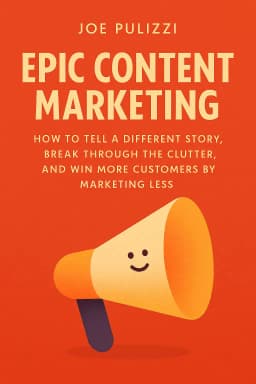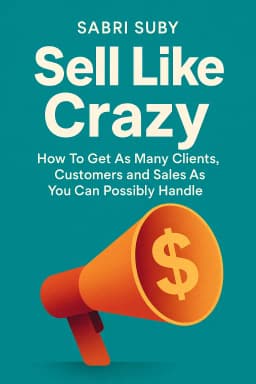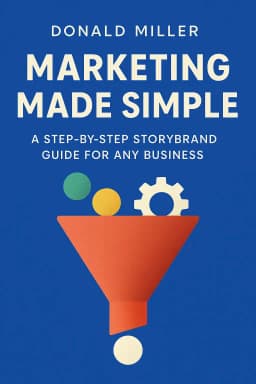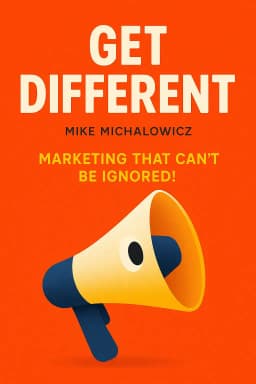
Marketing's Great Inversion
Golden Hook & Introduction
SECTION
Olivia: Most marketing is a colossal waste of money. Not because the ads are bad, but because the entire philosophy is wrong. Today, we explore a book that argues the secret to winning more customers is to stop marketing to them almost entirely. Jackson: Hold on, stop marketing? That sounds like a recipe for bankruptcy. What on earth are we talking about? Olivia: We are talking about a fundamental shift in thinking, and it’s all laid out in the book Epic Content Marketing by Joe Pulizzi. And before you dismiss it, you should know that Pulizzi is the founder of the Content Marketing Institute. He built it from a small startup into a multi-million dollar business with almost zero traditional advertising. Jackson: Okay, that’s a pretty compelling resume. If he practiced what he preaches and it worked, I’m listening. So what’s the big secret? Olivia: The secret starts with a very blunt, uncomfortable truth. It’s the first thing you have to accept before any of this makes sense.
The Great Marketing Inversion: Stop Selling, Start Serving
SECTION
Olivia: Pulizzi states it plainly: "Your customers don’t care about you, your products, or your services. They care about themselves." Jackson: Wow. That’s… brutal. And it feels wrong. Of course they care about my product if it solves their problem. That’s why they buy it. Olivia: They care about their problem being solved. They don't care about your company's quarterly earnings or your new logo. The mistake we all make is thinking our marketing should be about us. Pulizzi argues that for the last 50 years, marketing has been a monologue. We shout about how great we are. Content marketing changes it to a dialogue, but one that starts by talking about them. Jackson: I can see that. But how do you build a business if you're not allowed to talk about what you sell? Olivia: You change your entire model. Pulizzi puts it this way: you have to stop renting media and start owning it. Think about it. An advertisement is rented space. You pay to interrupt someone for 30 seconds. A blog, a podcast, a YouTube channel… that’s owned media. You’re building a platform that people choose to visit. Jackson: It’s like the difference between a commercial on TV and a show you actually set your DVR to record. Olivia: Exactly! And the data backs this up. One study found that 80 percent of buyers prefer to get company information in a series of articles versus an advertisement. People are actively avoiding the old model. They want to be informed or entertained, not sold to. Jackson: That makes sense, but 'owning media' sounds huge and expensive. It sounds like I have to go start a TV network. How does a normal business, a small business, actually do this? Olivia: This is my favorite part, because the most powerful example in the book isn't some mega-corporation. It’s a small, 20-employee company called River Pools and Spas. In late 2008, during the financial crisis, they were on the verge of going out of business. Jackson: A pool company during a recession. That sounds rough. Olivia: It was. Their customers were calling to get their deposits back. The owner, Marcus Sheridan, was desperate. He realized he couldn't out-spend his competitors on advertising, so he decided to out-teach them. He sat down and made a list of every single question a customer had ever asked him about fiberglass pools. Jackson: Every question? Olivia: Every single one. Even the uncomfortable ones, like "How much does a fiberglass pool cost?" Most businesses hide their pricing. He wrote a detailed blog post explaining exactly what goes into the cost. He wrote about the pros and cons of fiberglass versus concrete. He wrote about the problems you could run into. He just answered everything, honestly and completely. Jackson: So he just… gave away all the answers for free? The stuff his salespeople were probably trained to handle? Olivia: Precisely. And in doing so, River Pools and Spas became the most trusted resource for information about fiberglass pools on the entire internet. People planning to buy a pool, from anywhere in the country, found his blog. They read, they learned, and they trusted him. Jackson: And I’m guessing they bought from him. Olivia: Their sales went through the roof, their marketing budget plummeted, and they became the number one installer of their kind in North America. They didn't sell pools; they sold answers. That's the great marketing inversion.
The Brand as Publisher: How Companies Become Media Empires
SECTION
Jackson: Okay, the pool company story is incredible for a small business. It’s a perfect David and Goliath tale. But does this idea scale? Can a huge corporation really stop advertising and just… blog? Olivia: That’s the perfect question, and it leads to the most fascinating part of this whole concept. This isn't some new, scrappy startup idea. Pulizzi shows that the most 'epic' examples of content marketing are actually over a century old. Jackson: A century? Wait, what are you talking about? How is that possible? Olivia: Let me introduce you to a magazine called The Furrow. It was first published in 1895. Jackson: 1895. Okay, you have my attention. Who published it? Olivia: A small, up-and-coming company you might have heard of: John Deere. Jackson: The tractor company? What does a tractor company from the 1800s have to do with modern digital marketing? Olivia: Everything. The Furrow was a magazine for farmers. But it wasn't filled with ads for John Deere plows. It was filled with articles on how to be a better, more profitable farmer. It taught them about new crop rotation techniques, soil management, and how to increase their yields. Jackson: So it was genuinely useful to them, whether they bought a John Deere product or not. Olivia: Exactly. It provided immense value. And in doing so, it built a level of trust and brand loyalty that no advertisement ever could. When it came time for a farmer to buy a new tractor, who do you think they trusted? The company that had been helping them improve their livelihood for years. That magazine is still published today, reaching over 1.5 million farmers in 40 countries. Jackson: That is absolutely mind-blowing. They were doing content marketing before the term, or even the internet, existed. But what about a modern, massive brand? Is anyone really doing this today at that kind of scale? Olivia: Absolutely. Look at LEGO. When their patent on the interlocking brick expired in the 80s, they were suddenly flooded with cheaper copycats. They were in serious trouble. Jackson: I can see how that would be a nightmare. How did they compete? Olivia: They didn't win by making cheaper bricks. They won by building a media empire. They created LEGO Club Magazine. They launched TV shows like Ninjago. They partnered on blockbuster movies. They built LEGOLAND parks. They created video games. They built an entire universe of stories. Jackson: Right, so the product becomes almost secondary to the world they've built around it. You're not just buying a box of bricks; you're buying a ticket into the LEGO universe. Olivia: You’ve got it. The content is the main attraction, and it supports the sale of the toy. Red Bull is another perfect example. They are a media company that happens to sell an energy drink. They host extreme sports events, they have a record label, they produce feature films. They create culture, and the drink is the price of admission.
Synthesis & Takeaways
SECTION
Olivia: So whether you're a small pool company on the brink of collapse, a 125-year-old tractor manufacturer, or a global toy giant, the principle Pulizzi lays out is the same. You stop interrupting what people are interested in, and you become what they are interested in. Jackson: That’s a powerful idea. But I have to bring up something that some readers and critics have mentioned. The title of the book is Epic Content Marketing. That word, 'epic,' puts a lot of pressure on people. Does every piece of content have to be a Hollywood movie or a 100-year-old magazine to work? It can feel overwhelming for a small team. Olivia: That’s a really fair point, and it’s a common concern. But Pulizzi clarifies this. 'Epic' doesn't necessarily mean expensive or grand in scale. It means being the best, most valuable, most trusted resource in your specific niche. Jackson: Ah, the niche is the key. Olivia: It’s everything. For River Pools, 'epic' was simply answering customer questions more honestly and thoroughly than anyone else on the planet. That was their niche. Their content was epic because of its value and completeness, not its production budget. It’s about being epic for the right people. Jackson: So the takeaway isn't 'go make a movie.' It's more like, 'find your audience's biggest, most urgent, unanswered question, and then answer it better than anyone else dares to.' Olivia: That is the perfect summary. That becomes your mission. And if you commit to that mission, you build an audience that trusts you, that follows you, and that, eventually, will buy from you. It's a long game, but it's the one that builds a truly resilient and beloved brand. Jackson: I love that. It feels so much more achievable and, frankly, more meaningful. So for our listeners who are inspired by this, what's one concrete thing they can do right now to start? Olivia: It’s incredibly simple. Sit down with your team and write down the top ten questions your customers ask you. Don't filter, don't edit, just list them out. That list isn't just a to-do list; according to this book, that's the blueprint for your future marketing. Jackson: A fantastic, practical start. This has been incredibly insightful, Olivia. It really flips marketing on its head. Olivia: It does. It asks you to be generous first, and the business will follow. Jackson: This is Aibrary, signing off.









